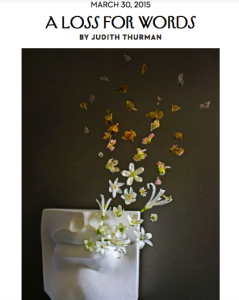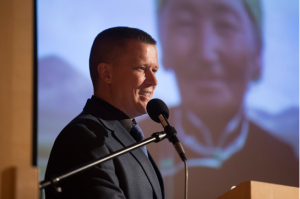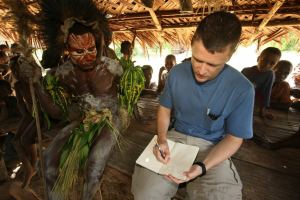From Today’s Lecturer: Protecting language diversity enriches humanity.
A Loss For Words (new article in the New Yorker)
A must-read article by Judith Thurman on endangered language revitalization will be published in the next issue of The New Yorker. Thank you for interviewing K. David Harrison for this powerful piece.
Here is a quote from the article: “Even when there is persecution, the challenge, as Harrison sees it, is to ‘increase the prestige of a language so that the young embrace it.’ ”
http://www.newyorker.com/magazine/2015/03/30/a-loss-for-words
Traditional Ecological Knowledge Workshop in Papua New Guinea
In October 2014, Dr. Gregory D. S. Anderson led a successful workshop at the Papua New Guinea University of Technology (Unitech) in Lae, Morobe Province, Papua New Guinea. The event was the first in a series of workshops on digital literacy skills for documenting traditional ecological knowledge and landscape stewardship of tok ples in Papua New Guinea.
The Living Tongues team consisted of Dr. Gregory D. S. Anderson, Rudolf Raward and Jonathan Anderson. During the course of the workshop, a total of twenty-one local students participated, along with Mr. Yat Paol, speaker of Waskia tok ples, who served as a participant observer. The event was made possible by a grant from the Christensen Fund.
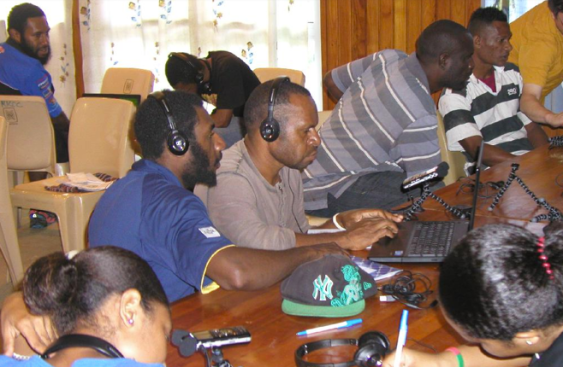 Students hard at work during the data processing practical at the Living Tongues Unitech workshop. Photo: Jonathan M. Anderson, Living Tongues Institute for Endangered Languages.
Students hard at work during the data processing practical at the Living Tongues Unitech workshop. Photo: Jonathan M. Anderson, Living Tongues Institute for Endangered Languages.
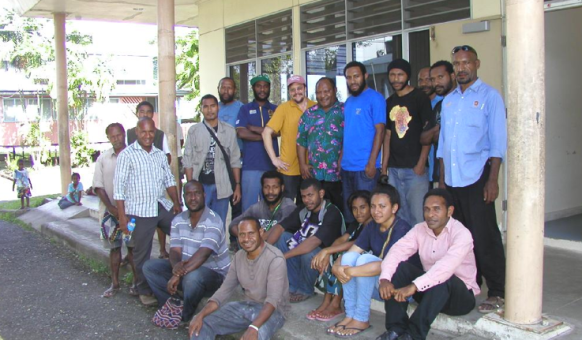 Some of the Unitech students who participated in first Living Tongues workshop. Front Row (L to R): Yat Paol (Waskia tok ples), Simon Mark (Sau Enga tok ples), Echo Yawip (Weri tok ples), John Cowan (Nakane elders tok ples among Kuman); Second Row: Maiga Gerega (Garihe Nego tok ples), Apolion Beba (Woodlark Muyuw tok ples), Caspar Smakus (Kuman tok ples), Nelson Tololo (Nakanai tok ples), Regina Kiele (Idio Manus tok ples), Lovelyn Kila (Melpa tok ples), Rudolf Raward (Living Tongues Institute and Panau tok ples); Back Row: Unitech IT Assistant Maliso Lero, Israel Timi (Samo Kundi Arapesh tok ples), Living Tongues Institute Director Dr. Greg Anderson, Unitech Professor Dr. Garry Sali, Paul Mark (Narak tok ples), Isaac Karts (Wahgi tok ples), Jason Yonai (Aren Aiome tok ples), Sam Kumao (Kamano Kafe Kanaitu tok ples), Unitech IT Officer Elvis Jack. Photo by: Jonathan M. Anderson, Living Tongues Institute for Endangered Languages. Missing: Chevastrine Somu (Yabem tok ples), Christie Paskalis (Nalik tok ples), Mark Kamananaya (Trobriand Islands tok ples), Melissa Brosnan (Naasioi tok ples), Susan Madana (Tunggak tok ples), Valentine Kekele (Mekeo tok ples), Walai Gairo (Mindi Korakaro (near Hiri Motu) tok ples). Photo: Jonathan M. Anderson, Living Tongues Institute for Endangered Languages.
Some of the Unitech students who participated in first Living Tongues workshop. Front Row (L to R): Yat Paol (Waskia tok ples), Simon Mark (Sau Enga tok ples), Echo Yawip (Weri tok ples), John Cowan (Nakane elders tok ples among Kuman); Second Row: Maiga Gerega (Garihe Nego tok ples), Apolion Beba (Woodlark Muyuw tok ples), Caspar Smakus (Kuman tok ples), Nelson Tololo (Nakanai tok ples), Regina Kiele (Idio Manus tok ples), Lovelyn Kila (Melpa tok ples), Rudolf Raward (Living Tongues Institute and Panau tok ples); Back Row: Unitech IT Assistant Maliso Lero, Israel Timi (Samo Kundi Arapesh tok ples), Living Tongues Institute Director Dr. Greg Anderson, Unitech Professor Dr. Garry Sali, Paul Mark (Narak tok ples), Isaac Karts (Wahgi tok ples), Jason Yonai (Aren Aiome tok ples), Sam Kumao (Kamano Kafe Kanaitu tok ples), Unitech IT Officer Elvis Jack. Photo by: Jonathan M. Anderson, Living Tongues Institute for Endangered Languages. Missing: Chevastrine Somu (Yabem tok ples), Christie Paskalis (Nalik tok ples), Mark Kamananaya (Trobriand Islands tok ples), Melissa Brosnan (Naasioi tok ples), Susan Madana (Tunggak tok ples), Valentine Kekele (Mekeo tok ples), Walai Gairo (Mindi Korakaro (near Hiri Motu) tok ples). Photo: Jonathan M. Anderson, Living Tongues Institute for Endangered Languages.
“Disappearing Languages” – K. David Harrison’s talk in Utah
Dr. K. David Harrison recently gave a presentation entitled “Disappearing Languages” at Brigham Young University, in Utah. He spoke about the factors leading to language extinction, why language preservation matters, and what steps are being taken to preserve endangered languages around the globe.
Read the excellent write-up by Samuel Wright, here:
http://humpreview.byu.edu/disappearing-languages/
Two Traditional Languages Evade Extinction With the Internet
By K. David Harrison
We live in an age of endless information. It is an age where knowledge can be preserved and accessed as never before. With major global languages dominating the internet, however, smaller languages may be left out, or even pushed down a pathway towards extinction. Remote communities such as the Yokoim and Panim people of Papua New Guinea, though they have little or no internet access, are eager to cross the digital divide and engage a global audience by sharing their languages on the world wide web.
To support those efforts, the National Geographic Enduring Voices project has just launched two new “Talking Dictionaries” for Yokoim and Panim, two small and endangered languages making their internet debut in 2014.
Read more on National Geographic: Explorers’ Journal.
Nick Waikai, Yokoim speaker and councilman of Manjamai village,
being interviewed by K. David Harrison. (Photo by Chris Rainier)
Languages Are Going Extinct Even Faster Than Species Are
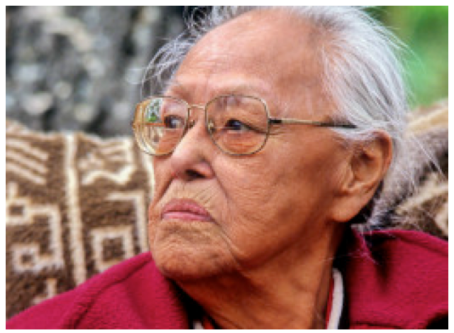 Eyak elder Marie Smith-Jones was honored at the Chickaloon powwow in 2001, Chickaloon, Alaska. (Photo by Marc Lester/Anchorage Daily News/MCT via Getty Images).
Eyak elder Marie Smith-Jones was honored at the Chickaloon powwow in 2001, Chickaloon, Alaska. (Photo by Marc Lester/Anchorage Daily News/MCT via Getty Images).
“The world’s roughly 7000 known languages are disappearing faster than species, with a different tongue dying approximately every 2 weeks. Now, by borrowing methods used in ecology to track endangered species, researchers have identified the primary threat to linguistic diversity: economic development. Though such growth has been shown to wipe out language in the past on a case-by-case basis, this is the first study to demonstrate that it is a global phenomenon, researchers say.” Read more on the Huffington Post.
Original article by Emily Underwood.
Tyler Heston reviews K. David Harrison’s acclaimed book, “The Last Speakers”
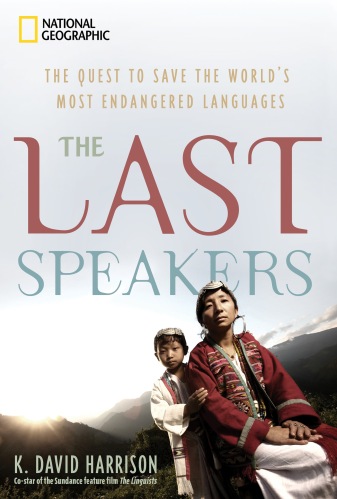 In Language Documentation & Conservation Volume 8 (2014), pp. 113-118, Tyler Heston reviews K. David Harrison’s acclaimed book, “The Last Speakers”:
In Language Documentation & Conservation Volume 8 (2014), pp. 113-118, Tyler Heston reviews K. David Harrison’s acclaimed book, “The Last Speakers”:
The Last Speakers is a highly personal look at language documentation, language endangerment, and language extinction. The book focuses on the experiences of individual speakers of highly endangered languages and the author’s own experiences as a linguist working with them. While aimed primarily at non-linguists, his engaging style, detailed examples, and colorful anecdotes make this a book that can be enjoyed by linguists and non-linguists alike.
Harrison’s work fulfills an important niche in the literature by not only discussing the need for documentation on a global level, but also by demonstrating the effects of endangerment on individual people and communities around the world. This juxtaposition of the local and global scales is one of the strong points of the work that sets it apart. The discussion of the global level sets the issues in context, while the individual stories exemplify the effects of endangerment on a personal level around the world.”
Download the full review by Tyler Heston here. Read the rest of Language Documentation & Conservation Vol.8. Order The Last Speakers on Amazon Enjoy!
Language Diversity in the United States
The infographic below was made by FreePeopleSearch.org. Among many other interesting facts, it shows that the people of the USA speak 420 languages, 214 of which are indigenous languages, and 206 are immigrant languages. Many of the indigenous languages are currently in danger of disappearing.
 , an infographic from FreePeopleSearch.org
, an infographic from FreePeopleSearch.org
Workshop at K’ulb’il Yol Twitz Paxil in Guatemala
Visit The Academy of Mayan Languages’ website and learn more about their excellent programs.
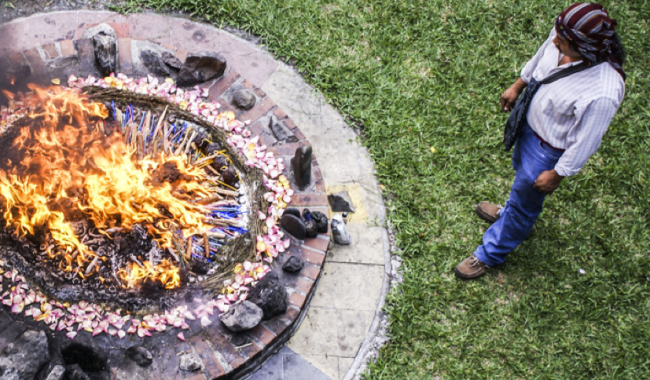 A Mayan ceremony featured on the The Academy of Mayan Languages‘ website
A Mayan ceremony featured on the The Academy of Mayan Languages‘ website“The Linguists” and Dr. K. David Harrison at Loudoun Campus
The Loudoun Campus will host, “Talk of the Town: A Film Screening of ‘The Linguists’ and Keynote Speaker Dr. K. David Harrison.” The Linguists is an Emmy-nominated documentary produced in 2008 by Ironbound Films.
Event details
Monday, April 14th, 2014. 7:30 p.m. to 9:30 p.m.
Loudoun Campus, Northern Virginia Community College (1000 Harry Flood Byrd Hwy, Sterling, VA 20164)
Waddell Theatre
This event is free and open to the public (more details here). There will be a question and answer session, book signing, and an Honors Program potluck to follow on the third floor in the LR lobby.
Screened at the Sundance Film Festival, “The Linguists” is a fascinating and compelling look at language extinction and documentation. It follows two linguists, Greg Anderson of the Living Tongues Institute for Endangered Languages, and Dr. K David Harrison of Swarthmore College as they travel from the Andes Mountains in South America to villages in Siberia, and from English-Hindi boarding schools in Orissa, India, to an American Indian reservation in Arizona.
The film addresses such issues as the spread of major global languages and how they contribute to language extinction, political and social reasons that some languages have been repressed, and reasons that language revitalization and language documentation are important.
In addition to being an anthropologist, Harrison is a National Geographic Fellow and a co-director of the Society’s Enduring Voices Project which documents endangered languages and cultures around the world. He has done extensive fieldwork with indigenous communities from Siberia and Mongolia to Peru, Colombia, India, Nepal and Australia. His work has been featured in numerous publications including The New York Times, USA Today and Science and on “The Colbert Report”. He received his doctorate from Yale University and is currently an associate professor at Swarthmore College near Philadelphia.
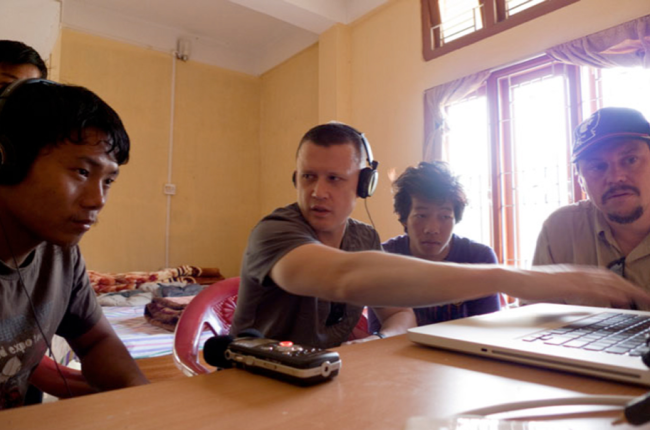 Anthony Degio (left) listens to playback of a Koro language story, with K. David Harrison, Takpa Yame and Greg Anderson. Photo by Jeremy Fahringer
Anthony Degio (left) listens to playback of a Koro language story, with K. David Harrison, Takpa Yame and Greg Anderson. Photo by Jeremy Fahringer
